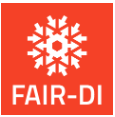Speaker
Description
The advancement of digitalization in catalysis and other scientific domains is marked by a transition from paper-based documentation to electronic lab notebooks, standardized protocols, and experiment automation. This shift promises enhanced reproducibility, comparability, and overall scientific progress. However, at the moment the field of catalysis still lacks universal standards for documenting results and centralized repositories for storing, sharing, and accessing research data. In response, we are adapting an existing open-source software, NOMAD, originally designed for computational data, to accommodate experimental and heterogeneous catalysis data. Through NOMAD, tailored tools for data publication and search are provided to catalysis researchers.
Data organization in NOMAD involves the creation of entries for each catalyst sample and activity performed on that sample. References between these entries and overview workflow views facilitate retrospective research tracking. A mixture of predefined templates for heterogeneous catalysis datasets and customizable entry schemas are available to upload catalysis research data. Functions to directly import and visualize measurement data from different file formats such as csv, excel and hdf5 exist in these schemas. Semantic enrichment by annotating quantities with links to concepts defined in ontologies or vocabulary such as Voc4Cat facilitates advanced and interoperable research data management including AI application in catalysis related research.
Additionally, NOMAD features the Heterogeneous Catalysis Explore App, allowing for the aggregation and visualization of all catalysis related data. In this app, a set of customizable widgets summarize both text-based and numerical data, with a focus on reaction and catalyst properties, aiding in visual analysis and filtering.
With these developments in NOMAD we address the need for a comprehensive repository for experimental catalysis data and the standardization of machine-readable, structured data publication in the field. Our efforts should facilitate the publication of FAIR and open catalysis data and streamline literature searches and AI-assisted data analysis in the field.
